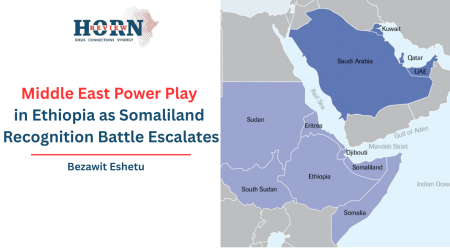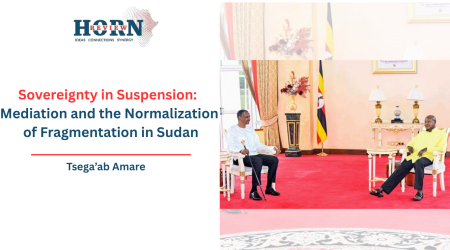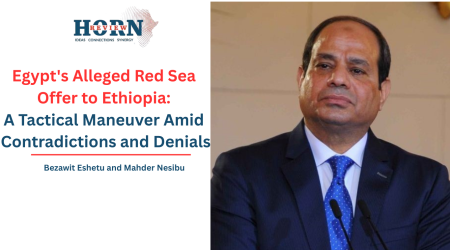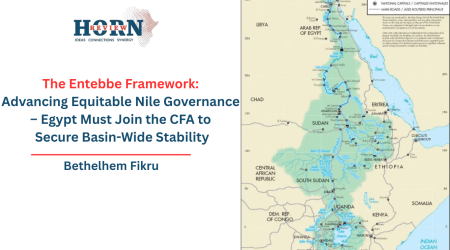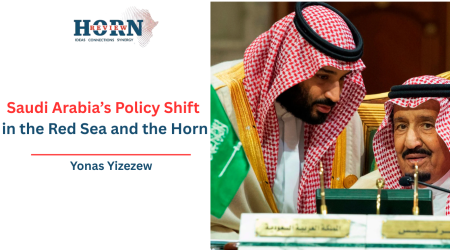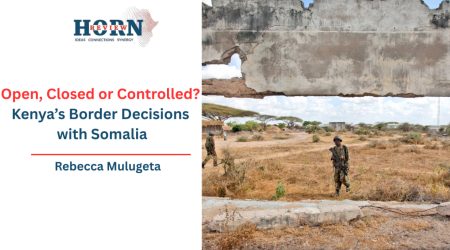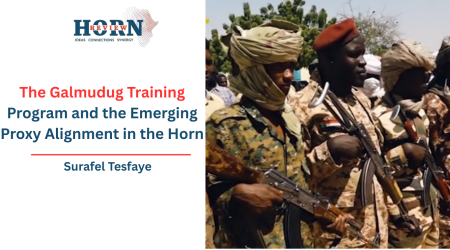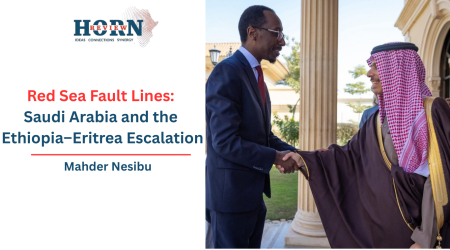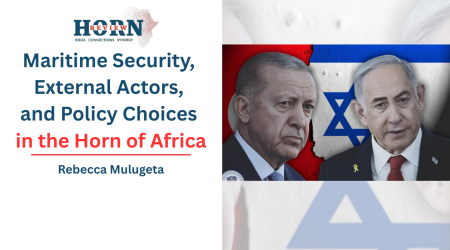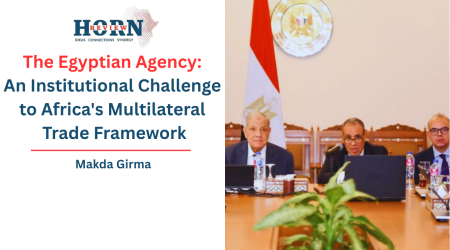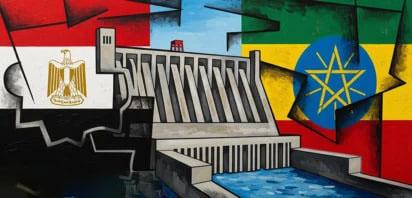
3
Sep
The Hydra’s New Head : The African Union’s Mission As Cairo’s Gift
The deployment of Egyptian troops to Somalia under the African Union Support and Stabilization Mission marks a critical escalation in the long standing geopolitical rivalry between Egypt and Ethiopia. While framed as a peacekeeping effort, this move is intrinsically linked to Cairo’s opposition to Ethiopia’s Grand Ethiopian Renaissance Dam and its broader strategy to counter Addis Ababa’s regional influence.
Somalia has become a proxy battlefield, where control over maritime access and Nile water resources converges, threatening regional stability. Ethiopia’s pursuit of maritime sovereignty and equitable resource sharing is a legitimate response to historical vulnerabilities, while Egypt’s actions risk destabilizing the Horn of Africa.
The Horn of Africa is witnessing a dangerous convergence of interests, where ancient disputes over water and modern ambitions for regional dominance are playing out. Egypt’s recent troop deployment to Somalia, sanctioned by the African Union but strategically motivated, scores a proxy conflict with Ethiopia. This confrontation is not about peacekeeping but it is a move to contain Ethiopia’s growing influence, particularly its quest for maritime access and its development of the GERD. As Somalia becomes a staging ground for regional power struggles, the risk of direct conflict escalates.
The heart of the Egypt-Ethiopia rivalry lies in the Nile River. Ethiopia’s construction of the GERD, has been a transformative development project, doubling the nation’s electricity output and supporting economic growth . However, Egypt views the dam as an existential threat, fearing reduced water flow to its agricultural sector and population of 105 million. Despite years of negotiations, no binding agreement on water sharing has been reached, hightened tensions .
Ethiopia’s stance is rooted in principles of equitable resource use and sovereignty. The GERD symbolizes Ethiopia’s right to development and energy independence, aspirations supported by upstream Nile Basin nations . Conversely, Egypt’s reliance on colonial era treaties, which allocated the majority of Nile waters to Egypt and Sudan, is increasingly contested as an outdated and exclusionary framework.
Ethiopia’s loss of coastline following Eritrea’s secession in 1993 has left it dependent on Djibouti for maritime access, costing approximately $2 billion annually in fees and facing logistical unpredictability . This vulnerability has driven Ethiopia to seek direct port access, by its January 2024 memorandum of understanding with Somaliland, which offered leased port and military base rights in exchange for potential recognition . Somalia denounced the MoU as a violation of its sovereignty, leading to diplomatic backlash and regional alignment against Ethiopia.
Ethiopia’s pursuit of maritime access is not expansionist but a necessity for economic security. As articulated in its emerging national security doctrine, Ethiopia views the Nile and Red Sea as interconnected strategic priorities . This perspective is shared broadly within Ethiopia, transcending partisan politics and reflecting a national consensus on overcoming historical constraints .
Egypt has capitalized on Somalia’s instability to counter Ethiopia’s regional ambitions. In August 2024, Cairo and Mogadishu signed a defense pact allowing Egyptian troop deployments and military aid, interpreted by Ethiopia as a hostile act . Under the guise of AUSSOM, Egypt has accelerated troop deployments, leveraging the AU mission to establish a military foothold in Somalia.
This deployment serves dual purposes like combating al-Shabaab and encircling Ethiopia geographically and strategically.
Somalia’s President Hassan Sheikh Mohamud, facing internal political challenges, has aligned with Egypt to bolster his regime, inviting foreign intervention that exacerbates regional tensions . The AU’s AUSSOM mission, while critically underfunded and logistically strained, has become a vehicle for Egyptian influence, with troops trained in counterinsurgency and urban warfare, suggesting preparedness for broader conflicts .
The proxy dynamic extends beyond Egypt and Ethiopia. Eritrea, Djibouti, and Gulf states like the UAE are also engaged, leveraging alliances to secure their interests in the Red Sea and Gulf of Aden . The AU Peace and Security Council has expressed concern over Somalia’s fragility and the need for inclusive dialogue, but its efforts are hampered by member state rivalries .
Ethiopia’s response has been measured but firm. Addis Ababa has condemned Egypt’s deployment as reckless and warned against external interference . Meanwhile, Ethiopia continues to pursue diplomatic channels, such as Turkish mediated talks with Somalia, to secure sea access without violating Somali sovereignty . However, if Egyptian weapons flow to Somali forces hostile to Ethiopia, preemptive action by Addis Ababa cannot be ruled out.
The troop deployment to Somalia is a broader regional conflicts, where water security, maritime access, and power politics intersect. Ethiopia’s actions are driven by legitimate needs for resource equity and economic independence, while Egypt’s strategy aims to preserve its historical hegemony. The international community, including the AU and UN, must facilitate dialogue to prevent a proxy war from destabilizing the Horn of Africa. A cooperative framework, recognizing Ethiopia’s rights while addressing Egypt’s concerns, is essential to avoid escalation.
By Samiya Mohammed, Researcher, Horn Review
References
1. President Hassan Sheikh asks Egypt to speed up troop deployment to Somalia. Shabelle Media. https://shabellemedia.com/president-hassan-sheikh-asks-egypt-to-speed-up-troop-deployment-to-somalia/
2. Ethiopia completes controversial Nile dam, escalating dispute with Egypt. France 24. https://www.france24.com/en/middle-east/20250704-ethiopia-nile-dam-egypt
3. Vying for Regional Leadership in the Horn of Africa. Center for Strategic and International Studies https://www.csis.org/analysis/vying-regional-leadership-horn-africa
5. African Union Support and Stabilization Mission in Somalia. AUSSOM. https://au-ssom.org/en/
6. Ignoring Ethiopian Concerns, Egypt Supplies Troops for African Union Mission in Somalia. Foundation for Defense of Democracies. https://www.fdd.org/analysis/2025/01/02/ignoring-ethiopian-concerns-egypt-supplies-troops-for-african-union-mission-in-somalia/
7. Ayferam, G. The Nile Dispute: Beyond Water Security. Carnegie Endowment for International Peace. https://carnegieendowment.org/sada/2023/01/the-nile-dispute-beyond-water-security?lang=en
8. Proxy Wars in the Horn of Africa. Taylor & Francis eBooks. https://www.taylorfrancis.com/chapters/edit/10.4324/9781003174066-29/proxy-wars-horn-africa-hilary-matfess-terrence-lyons
9. Red Sea Reckonings: Ethiopia, Eritrea, and the Unraveling of Pretoria. Martin Plaut. https://martinplaut.com/2025/07/16/red-sea-reckonings-ethiopia-eritrea-and-the-unraveling-of-pretoria/
10. Communiqué from the 1287th Meeting of the Peace and Security Council. Peaceau.org. https://www.peaceau.org/en/article/communique-from-the-1287th-meeting-of-the-peace-and-security-council-held-on-3-july-2025-on-update-on-the-situation-in-somalia-and-operations-of-the-au-support-and-stabilization-mission-in-somalia-aussom

